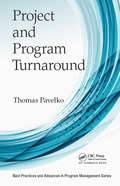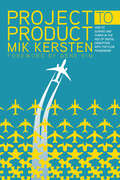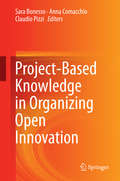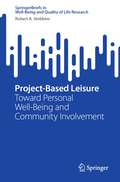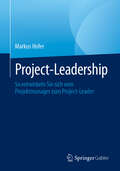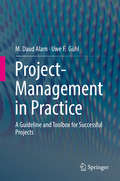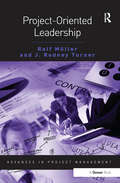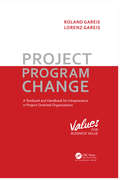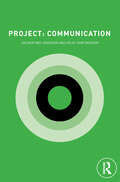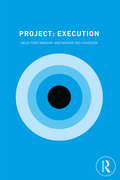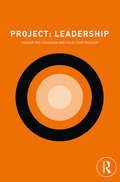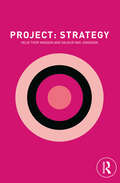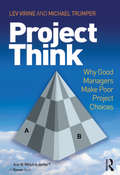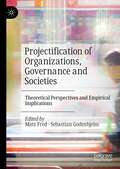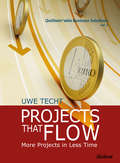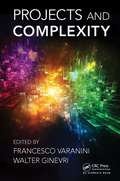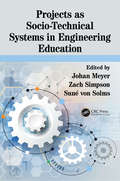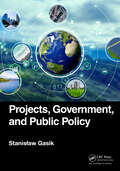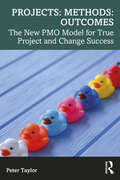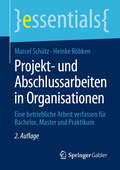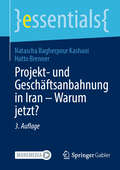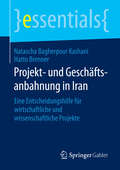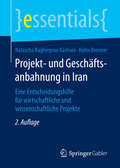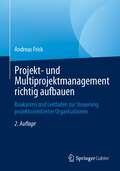- Table View
- List View
Project and Program Turnaround (Best Practices in Portfolio, Program, and Project Management)
by Thomas PavelkoThe U.S. economy thrives on the development of new products, new systems, and new processes. Usually, these advances start as a flash of inspiration by highly creative individuals. It is complex and difficult to go from initial inspiration to a final product, process, or system. So it is not surprising that approximately one out of every four development programs fails. A development program or project in trouble is distinct from a program encountering typical development difficulties. Such a program or project can appear to be in free fall. This book identifies the essential fundamentals for executing a program or project turnaround effectively. These fundamentals include: Clearly identifying the next critical accomplishment needed for success Assigning responsibility for each program task to one person Capitalizing on colocation and face-to-face communication Recruiting problem solvers Wining commitment from team members Using team accomplishments to propel high team morale The guidance provided in this book is applicable to all program or project genres, including manufacturing, nonprofit work, education, medicine, investment management, and municipal management. Software has become a great part of both providing product functionality and assisting with managing product development. A special chapter devoted to software development dispels common misconceptions and provides guidance for turning around this special type of project or program. This book is a highly valuable source of insight for a wide range of readers, including management professionals, business students, and executive managers. Every member of a product or project development team will find its recommendations to be of high value.
Project to Product: How to Survive and Thrive in the Age of Digital Disruption with the Flow Framework
by Mik KerstenAs tech giants and startups disrupt every market, those who master large-scale software delivery will define the economic landscape of the 21st century, just as the masters of mass production defined the landscape in the 20th. Unfortunately, business and technology leaders are woefully ill-equipped to solve the problems posed by digital transformation. At the current rate of disruption, half of S&P 500 companies will be replaced in the next ten years. A new approach is needed.In Project to Product, Value Stream Network pioneer and technology business leader Dr. Mik Kersten introduces the Flow Framework—a new way of seeing, measuring, and managing software delivery. The Flow Framework will enable your company&’s evolution from project-oriented dinosaur to product-centric innovator that thrives in the Age of Software. If you&’re driving your organization&’s transformation at any level, this is the book for you.
Project-Based Knowledge in Organizing Open Innovation
by Sara Bonesso Anna Comacchio Claudio PizziEnriching understanding of the current theoretical debate on project-based learning and R&D sourcing, 'Project-based Knowledge in Organizing Open Innovation' draws on innovation literature and knowledge-based perspectives to solve open problems in the relationship between knowledge development at project level and how firms organize product innovation combining in-house R&D activities with inbound open innovation. Through field research in different industrial settings (pharmaceutical, automotive and machine tools) and with complementary methodological approaches, this book provides empirical evidence on how project knowledge features affect sourcing decisions at firm level. Due to the emerging interest in the management literature on project-based organizations and on the relevance of project forms of organizing in a knowledge-based economy, this volume will appeal to scholars and students in business and management, in particular those in innovation management, organization theory and strategic management. Addressing the still open issue of how the firm level should be complemented by studies at the project level of analysis, this book provides theoretical and empirical arguments on the advantages of a more fine-grained level of analysis to understand how firms organize their innovation processes across boundaries.
Project-Based Leisure: Toward Personal Well-Being and Community Involvement (SpringerBriefs in Well-Being and Quality of Life Research)
by Robert A. StebbinsThis short book discusses the relatively new concept of project-based leisure in leisure research, and relates it to individual and community well-being and quality of life. The book defines PBL as a short-term, reasonably complicated, one-off or occasional, though infrequent, creative undertaking carried out in free time, or time free of disagreeable obligation. Such leisure requires considerable planning, effort, and sometimes skill or knowledge. The book discusses how PBL contributes to subjective well-being, though doing so more modestly than serious leisure and occupational devotion. The book surveys existing field research of the author’s own and other studies, and provides original insights on how PBL activities can be used to generate community involvement and subjective well-being.
Project-Leadership: So entwickeln Sie sich vom Projektmanager zum Project-Leader
by Markus HoferProjekte sind heute komplexer denn je. Reines Projektmanagement ist hier längst nicht mehr ausreichend. Statt Methoden, Checklisten und Tools wird heute durch effektives Leadership in Projekten entschieden, ob diese ein Erfolg sind. Projektmanager müssen sich zu herausragenden Führungskräften entwickeln, um ihre interdisziplinären Teams, meist ohne direkte Führungsverantwortung in der Linie, zu führen. Dieses praxisorientierte Buch zeigt Ihnen den Weg, wie Sie sich vom Projektmanager zu einem echten Project-Leader entwickeln. Lernen Sie, wie Sie Ihre Teams durch Vision, Kultur und emotionale Intelligenz zu Höchstleistungen führen und auch in Krisenzeiten den Überblick behalten. Sie erfahren, wie Sie die richtigen Leadership-Kompetenzen aufbauen, um Projekte nicht nur erfolgreich abzuschließen, sondern zu übertreffen. Durch zahlreiche Praxisbeispiele und sofort umsetzbare Techniken bietet dieses Fachbuch einen klaren Fahrplan zur Transformation vom Projektmanager zum Project-Leader. Werden Sie der Project-Leader, den Ihr Team braucht. Inspirieren Sie andere durch Ihre Projekt-Vision und schaffen Sie eine Kultur des Erfolgs. Der Inhalt Die Rolle von Leadership in Projekten Der Project-Leader: Rollen, Kompetenzen, Projektorganisation, Agilität, Mindset, Lead by Example, Coaching Die 5 Faktoren für herausragendes Leadership: Projekt-Vision, Kultur, High-Perfomance-Teams, Teamführung, Selbstführung Projektorientierte Unternehmen Zahlreiche Praxisbeispiele und Interviews mit Experten Mit Online-Inhalten, Self-Assessment und Vorlagen
Project-Management in Practice
by M. Daud Alam Uwe F. GühlThis practice-oriented book explores a variety of cross-project topics and specific aspects of different project phases. It also offers tips, examples, templates and checklists, and discusses concrete problems and solutions from project practice in IT and the automotive industry. The authors combine their extensive practical experience in years of project work with relevant project-management theory. Each chapter begins with a list of the learning objectives and concludes with a summary of the insights provided. Accordingly, the book offers a valuable resource for: Beginners wishing to acquire basic project management skills Participants in more advanced project management training who are looking for instructional material Project management experts who want to learn about further aspects, and to employ templates and checklists for even more successful projects
Project-Oriented Leadership (Advances in Project Management)
by Ralf Muller J Rodney TurnerFrom the perspective of delivering successful projects, the value of a skilled project sponsor and project manager outweighs many other factors. Projects need leaders who can give them vision, identity, keep the stakeholders and the project team on board and make the difficult decisions that will enable the project to continue (or, if necessary, be terminated). These are human skills that don't necessarily feature large in the project management bodies of knowledge. Ralf Müller and Rodney Turner's Project-Oriented Leadership explains the key leadership models of managerial, intellectual and emotional leadership and shows how they can be applied within projects to lead processes, functions and people, and ensure an ethical and inclusive approach within projects and programs.
Project. Program. Change
by Roland Gareis Lorenz GareisThis book gives managers an integrative approach to project, program, and change management. It describes the differences between change in projects versus programs with case studies in both areas and the different life cycles. While the project and change comprise much of the book, it is up to date with its emphasis on agile, scrum, and benefits. The book also describes methods to both initiate and manage a change and what must be done for success and business value.
Project: Communication
by Helgi Thor Ingason Haukur Ingi JonassonAll teamwork is grounded on effective communication. Project Communication enables project managers, leaders of project teams and team members to get their ideas heard, facilitate effective teamwork, create a culture of openness and creative thinking--in short, a culture of effective communication within their team. . The book opens with an orientation on what group dynamics and interpersonal communication entail, particularly in terms of management teams. It then guides the reader on a personal journey whereby different theories and concepts in group dynamics, communication and project team management are gradually introduced. Readers are encouraged to use the book to explore and improve their personal communication style, with the aim of sustaining growth and development within project teams and their respective organisations. Project Communication is an ideal companion to professionals, specialists, and project managers who are leading or working in teams within all types of organisations, businesses, NGO´s and governmental and transnational institutions. The book should be of interest to all those who want to use psychological knowledge to improve their teams. It is also a practical guide that can be used as a training course in interpersonal communication in general, with a special focus on project teams.
Project: Execution
by Helgi Thor Ingason Haukur Ingi JonassonStrategic planning is the starting point for projects and often the primary reason for a project’s success or failure. Project leaders and project-orientated organisations need to understand strategic planning to understand their position and environment, and make rational decisions when selecting and defining their projects and programmes. The authors provide the reader with a straightforward, comprehensive understanding of the basics of project management, including the present status of the discipline, its history, and theoretical foundations. With emphasis on the project life cycle, it is designed to support the IPMA D, C, or B level qualifications, and IPMA Competence Baseline 4.0, providing you with all the information needed to pursue certification. Project: Execution is also an ideal introductory textbook to progressive programmes on strategic planning, with a focus on collaborative work, open strategy, and an exploration of open strategic planning on a social level. It provides a wealth of learning tools and case studies to demonstrate best practice. This is the ideal guide to project planning for anyone that wants their planning decisions to be as wise as they are savvy.
Project: Leadership
by Helgi Thor Ingason Haukur Ingi JonassonProjects need leaders who are able to bring out the best in others, unite their teams, engage business partners and facilitate harmonious delivery. Project Leadership explains the core features of leadership for project managers, enabling them to develop a leadership style that is authentic and transparent, informed by a perspective of psychological understanding and personal growth. This book enables both potential and prominent leaders to dig deeper into the meaning of leadership, fostering personal growth which enables professional development. It opens with an introductory orientation on leadership and links it with management in general and project management in particular. The reader is then encouraged to take an introspective approach, underpinned by the fundamentals of cognitive-behavioural psychology and theories of personal growth, in order to develop authenticity in their leadership style. To this end, the reader is encouraged to develop an awareness of unconscious aspects of their personality with the help of insights from depth psychology, as well as the fundamentals of creative thinking, ethical thinking and logical thinking. This is all carefully and pragmatically applied to the context of leadership of projects, with the aim to foster growth and development in individuals, project teams and organisations. Project Leadership is also an ideal introductory book for undergraduate and postgraduate leadership programs.
Project: Strategy
by Helgi Ingason Haukur JonassonStrategic planning is the starting point for projects and often the primary reason for a project’s success or failure. It has the potential to enable every organisation to realise its ideals and actualise its values, whether it be a small start-up business, a large international company or even an entire society. Project leaders and project-orientated organisations need to understand strategic planning to recognise their position and environment, and make rational decisions when selecting and defining their projects and programs. But, those same principles can have broader, more profound, and more ambitious applications too. <P><P>Project: Strategy is a practical handbook that enables organisations of any size, and employees at all levels within them, to form strategic plans and actively contribute to them throughout a project’s development. Rather than focus on superficial exercises, this book draws from knowledge outside of business and management – humanities, philosophy, psychology, technology, and engineering – to create a holistic view and a depth of understanding you would never achieve with SWOT analysis alone. Taking the reader on a pragmatic journey, it teaches self-reflexion, social responsibility and creative thinking with application to their projects and plans, but also to their working relationships and to their organisations. <P><P>This book is also an ideal introductory book to progressive programs on strategic planning, with a focus on collaborative work, open strategy, and open strategic planning on a social level. It provides a wealth of learning tools and case studies to demonstrate best practice. This is the ideal guide to project planning for anyone that wants their planning decisions to be as wise as they are savvy.
ProjectThink: Why Good Managers Make Poor Project Choices
by Lev Virine Michael TrumperProjects are constantly beset by problems, often caused by seemingly small mistakes which collectively lead to larger issues. Why do project managers and teams appear to repeat the same mistakes? Can they make better choices without introducing complex decision analysis processes? How can they make better estimates? Project management is the art and science of human interactions. ProjectThink identifies and explains the paths of those intentional and unintentional actions that lead to trouble. It provides advice and guidance in analysing information and risk and explains how ’choice-engineering’ can facilitate decision-making and encourage everyone involved in a project to follow the right procedures and work collaboratively.
Projectification of Organizations, Governance and Societies: Theoretical Perspectives and Empirical Implications
by Mats Fred Sebastian GodenhjelmThis book is about projectification – a concept that captures the increasing reliance on “the project” in contemporary societies, governance and economies. Despite its significance, this development and transformation, not only of public and private organizations but also our working environment and way of living, has received little scholarly attention compared to other major societal movements. Since its conceptualization in 1995 the phenomena of projectification has grown in scope, and researchers beyond management and organization studies have argued for and applied a broader and critical perspective to what projects are and how we are to understand the term. This volume gathers researchers who critically examine the function and effects of “the project”, and analyzes the logic, politics, discursive practices and contexts of projectification. The book consolidates this research field by illustrating theoretical perspectives on, and empirical implications of, projectification. It also highlights the need for more research, and provides encouragements for other disciplines to scrutinize this phenomenon from other perspectives.
Projects That Flow: More Projects in Less Time (QuiStainable Business Solutions #2)
by Uwe TechtProjects can go over budget, exceed deadlines, or deliver restricted features and quality, which can result in economic damage for companies and their clients. Difficulties arise at the source, and established metrics and management methods slow projects down by creating conflicts in operations and decision making. Introducing a radically new approach that features simple, constraint-oriented management; clear, robust priorities; company-wide optimization; and a focus on speed, this volume shows how to complete more projects with the same amount of resources, reliably deliver all projects to specs, and significantly shorten project lead times.
Projects and Complexity: Theory, Methods, And Applications (Systems Innovation Book Ser.)
by Adedeji B. BadiruHelpful to those tasked with managing complex environments, Projects and Complexity introduces a new way of looking at projects and fostering the culture needed to achieve sustainable results. It brings together experts from the academic, military, and business worlds to explore project management in the context of complexity theory and organizatio
Projects as Socio-Technical Systems in Engineering Education
by Johan Meyer Zach Simpson Suné Von SolmsThis book presents the case for Project-Based Learning within Socio-Technical Systems in Engineering Education. The book highlights the importance of projects as Socio-Technical Systems as a means for supporting and enhancing international accreditation of engineering programs. Practical examples illustrate how Socio-Technical Systems are brought into the educational environment through Project-Based Learning. The book goes on to discusses the impact this may have on Engineering Education practice. <P><P>The work presented will enable engineering educators to develop curricula that can respond to societal needs, while also enhancing teaching and learning. It offers an approach to engineering education that centers on engaging scholars in projects that are located within socio-technical systems. University, government and industry leaders will gain from this book as it provides insight into strategic planning and partnership-building for Engineering Education. We hope this book will further foster deep scholarship of research to ready engineering faculties for engaging responsibly with their surrounding communities. <P><P>Features: <li>Offers applications of Project-Based Learning (PBL) in Engineering Education <li>Matches elements of Socio-Technical Systems in Higher Engineering Education, with the Exit Level Outcomes (ELOs) required by professional engineering bodies <li>Provides practical examples for the establishment of project environments within an academic faculty <li>Shows examples in the success of execution of projects involving engineering educators, researchers, program developers, government agencies and industry partners <li>Presents a framework to develop Project-Based Learning in Engineering Education that addresses Socio-Technical requirements and will enable engineering educators to collaboratively develop engineering curricula with industry that will respond to societal needs
Projects, Government, and Public Policy
by Stanisław GasikMany governments have effectively organized public project implementation systems in their jurisdictions. At the same time, many other countries remain at a less advanced level of public project management. Globally, there is a need for project management knowledge to be transferred between governments. However, no systematic review of these practices has been developed to date. Projects, Government, and Public Policy was written to fulfill this need and presents a review of project management practices in countries with developed project-based capabilities. This book uses its own rigorous model to present this review systematically. This book’s practical purpose is to give a structured overview of government-level project management practices. This knowledge can be used in the work of governments to improve the management of public projects and the implementation of public policies. Many professionals working in public institutions understand project management concepts differently than project management professionals. Therefore, this book begins with a chapter that describes the differences between the conceptual basis of public administration and project management. The body of this book has five parts. Part I is mainly intended for those involved in government and public administration who want to acquire or increase knowledge about project management. Part II provides an overview of the basic concepts from the theory of public administration, public policies, and development management. Part III describes what makes public projects unique and the success factors specific to projects of this sector. Knowledge about effective government project management practices is covered in Part IV. The concluding Part V begins with a general overview of the maturity model concept. Its main part covers the description of a maturity model showing ways to systematically improve the implementation of public projects. This book is written for governments and government administrators, including the most influential decision-makers, who craft policies to guide a country’s development as well as how to implement projects. This book is also intended for supporters and enthusiasts of project management in government and public administration by providing them with a description of the solutions used by project management in public administration. This book is intended, too, for all project management practitioners working for public projects: project managers, team members, sponsors, and middle-level executives of project-delivering private companies. By knowing public administration concepts, they can manage their projects better and use a common language with their clients.
Projects: The New PMO Model for True Project and Change Success
by Peter TaylorMatching the speed of change in modern business, this book takes readers on a two-year journey in building a project management office (PMO) for today and tomorrow and redefines the PMO as to what it should focus on: Projects, Methods, and Outcomes. Many organisations invest heavily in PMOs, but these are built on an outdated and static model that does not fit a hybrid, agile, AI-empowered, and rapidly changing business environment. Building on his renowned "balanced PMO" model, project management leader Peter Taylor tackles today’s challenges with this diary-style guide to inspire all PMO leaders, project managers, and business leaders, and provide a roadmap to follow to build (or rebuild) their own PMOs. He presents a completely new definition of "PMO", eliminating the traditional back-office concept of a centralised PMO, with his "Projects: Methods: Outcomes" construct that provides a truly business focused team to oversee the delivery of value to their organisation. Enriched with case studies and practical models, this book will benefit all PMO leaders, project management professionals, change and transformation leaders, and anyone interested in how to deliver business value through projects.
Projekt- und Abschlussarbeiten in Organisationen: Eine betriebliche Arbeit verfassen für Bachelor, Master und Praktikum (essentials)
by Marcel Schütz Heinke RöbkenMarcel Schütz und Heinke Röbken zeigen die Besonderheiten einer Projekt- oder Abschlussarbeit mit einem organisatorischen Bezug in einem Unternehmen, einem Verband, einer sozialen Einrichtung oder einer Behörde auf. Dieser Leitfaden kann von Studierenden diverser Studiengänge und aller Hochschultypen genutzt werden und eignet sich gleichermaßen sowohl für Absolventen grundständiger als auch dualer und weiterbildender Studiengänge. Ein Schwerpunkt liegt auf den Sozial- und Wirtschaftswissenschaften. In dieser überarbeiteten zweiten Auflage wurden weitere nützliche Informationen zur Durchführung aufgenommen, die Form der Darstellung optimiert und verschiedene Daten aktualisiert. Autorin und Autor betreuen seit Jahren regelmäßig auch betrieblich orientierte Studienarbeiten.Die Autoren:Marcel Schütz ist Research Fellow Betriebswirtschaft an der Northern Business School Hamburg. Daneben unterrichtet er an der Universität Oldenburg und der Universität Bielefeld und hat Praxiserfahrung im Personalwesen. Dr. Heinke Röbken ist Professorin für Bildungsmanagement an der Universität Oldenburg. Daneben verantwortet sie das Lehrgebiet Empirische Forschungsmethoden in MBA- und aufbauenden Management-Studiengängen.
Projekt- und Geschäftsanbahnung in Frankreich: Grundwissen auf den Punkt gebracht (essentials)
by Hatto Brenner Brigitte Souveton-ReichelDiese kompakte Einführung gewährt einen fundierten Einblick in die gesellschaftliche, wirtschaftliche und politische Situation Frankreichs. Übersichtlich und auf das Wesentliche konzentriert erläutern die Autoren die französischen Kulturstandards und vermitteln ein solides Grundwissen über das Land. Deutschland und Frankreich sind füreinander die wichtigsten Partner in Politik und Wirtschaft. Geografisch so nah, sind die beiden Länder kulturell jedoch sehr weit voneinander entfernt. Nicht selten kommt es bereits im Vorfeld von Kooperationen zu Missverständnissen, die eine Geschäftsbeziehung erschweren oder scheitern lassen. Dieses essential bietet Entscheidungshilfen für die erfolgreiche Umsetzung von geschäftlichen Projekten in Frankreich.
Projekt- und Geschäftsanbahnung in Iran – Warum jetzt? (essentials)
by Hatto Brenner Natascha Bagherpour KashaniIm vorliegenden Buch teilen die Autoren ihre langjährigen Erfahrungen und Erfolge bei der Initiierung und Durchführung nachhaltiger Projekte mit iranischen Partnern. Im Kontext des sogenannten "Atomdeals" (JCPOA) sowie der geopolitischen Veränderungen in der von Spannungen begleiteten Region des sogenannten Nahen bzw. Mittleren Ostens zeigen sie auf, wie wissenschaftliche Institutionen, Firmen und Kulturschaffende mit Iran als vielversprechendem Partner trotz politischer Spannungen kooperieren können. Die Verbindung von wissenschaftlichen Erkenntnissen, kulturellem Wissen und praktischer Wirtschaftskompetenz macht dieses Buch zu einer wertvollen Orientierungshilfe für alle, die sich für die Möglichkeiten in Iran interessieren. Durch persönliche Anekdoten erhält das Buch eine authentische und unterhaltsame Note, während praktische Tipps aufzeigen, wie der Austausch und die Zusammenarbeit mit iranischen Partnern auch in herausfordernden Zeiten gelingen kann.
Projekt- und Geschäftsanbahnung in Iran: Eine Entscheidungshilfe für wirtschaftliche und wissenschaftliche Projekte (essentials)
by Natascha Bagherpour Kashani Hatto BrennerDiese kompakte Einführung gewährt einen Einblick in ein faszinierendes Land, gibt Erklärungen zu Sanktionen sowie zu iranischen Kulturstandards und bietet Entscheidungshilfen für die Projekt- und Geschäftsanbahnung in Iran. Die Islamische Republik ist eines der stabilsten Länder in einer von Kriegen erschütterten Region und zudem reich an Ressourcen, Bevölkerung und Bildung. Geschichtlich, wirtschaftlich, wissenschaftlich, energie- und friedenspolitisch ist Iran von großem Interesse auch für Europa. Deutsche Institutionen und Firmen profitieren von dem guten Ruf der Verlässlichkeit und Kompetenz. Die Autoren erläutern, wie deutsche Unternehmen oder auch wissenschaftliche Einrichtungen das hohe Potenzial einer deutsch-iranischen Zusammenarbeit nutzen können.
Projekt- und Geschäftsanbahnung in Iran: Eine Entscheidungshilfe für wirtschaftliche und wissenschaftliche Projekte (essentials)
by Natascha Bagherpour Kashani Hatto BrennerDieses essential gewährt einen Einblick in ein faszinierendes Land, stellt iranische Kulturstandards vor und bietet Entscheidungshilfen für die Projekt- und Geschäftsanbahnung in Iran. Die Islamische Republik ist eines der stabilsten Länder in einer von Kriegen erschütterten Region und zudem reich an Ressourcen, Bevölkerung und Bildung. Deutsche Institutionen und Firmen profitieren von dem guten Ruf der Verlässlichkeit und Kompetenz. Die Autoren erläutern, wie Unternehmen oder auch wissenschaftliche Einrichtungen das hohe Potenzial einer deutsch-iranischen Zusammenarbeit nutzen können. Die Neuauflage beinhaltet aktuelle Informationen zu aufgehobenen und weiter bestehenden Sanktionen sowie einen Ausblick auf zukünftige Entwicklungen im Zusammenhang mit den Atomverhandlungen.
Projekt- und Multiprojektmanagement richtig aufbauen: Baukasten und Leitfaden zur Steuerung projektorientierter Organisationen
by Andreas FrickDieses Buch bietet eine praxiserprobte Arbeitsanleitung für die Entwicklung und Einführung des Projekt- und Multiprojektmanagements. Es zeigt den gesamten Projekt- und Multiprojektmanagement-Prozess auf und zeigt Ihnen wer, wann und mit welchen Themen mit einbezogen werden sollte. Hierbei werden sowohl planbasierte als auch die agilen Arbeitsformen der Projektarbeit berücksichtigt. Ein unentbehrlicher Wissensbaukasten, um individuelle Transformationsprojekte, hin zur projektorientierten Organisation, zu definieren und zum Erfolg zu führen.
